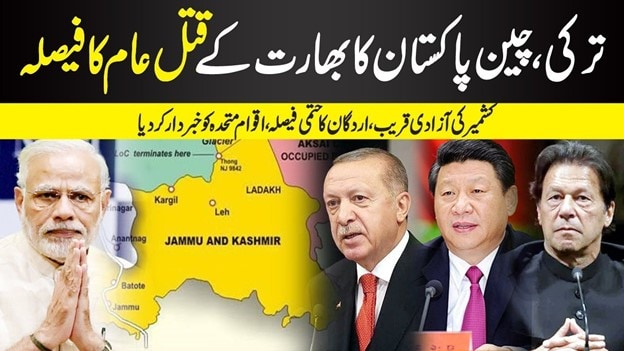
The year 2021 marks the emergence of a new Eastern alliance. MEMRI has been the first to richly document its rise, illustrated by a wide variety of media content.[1] Brought into sharp relief by the bloody November 2020 war between Azerbaijan and the Armenians of Artsakh, the alliance between three authoritarian regimes – in Turkey, Azerbaijan, and Pakistan – seems to have acquired a surprising silent partner in the People's Republic of China. This is surprising because the first three countries are Muslim states, which are not shy about using religion as a tool of statecraft, but not so surprising because this alliance is as much about mutual cooperation as it is directed against a disparate group of potential adversaries large and small – India, Armenia, and the United States.[2] Some might add Russia and Iran to this list, but both countries are as often collaborators as they are rivals of their authoritarian neighbors.
The connections are not new. Religious, political, and emotional ties between the Muslims of then-British India and Turkey date to the end of the Ottoman Empire in the early 20th century. Both Turkey and Pakistan (along with Pahlevi Iran and Hashemite Iraq!) were members of the ill-fated U.S./U.K.-supported Central Treaty Organization (CENTO) in the late 1950s. Pakistan reportedly facilitated the sending of 1,500 Afghan fighters belonging to Gulbuddin Hekmatyar's faction to fight against Nagorno-Karabakh Armenians in 1993. But it is with the rise of Recep Tayyip Erdoğan as Turkey's president and the failed 2016 coup against him that these trilateral ties have blossomed. The first trilateral summit between Turkey, Azerbaijan, and Pakistan was held in 2017, while the second just concluded last month in Islamabad.[3] Islamabad has supported Turkey on Northern Cyprus and Azerbaijan on Nagorno-Karabakh, while those countries have reciprocated in supporting Pakistan on Kashmir.
Turkey's ties now make it Pakistan's second-largest arms supplier, after Islamabad's longtime patron China.[4] Pakistan has been helpful to Turkey in the defense field as well, especially in pilots after the Turkish purge of its air force after the failed 2016 coup. Of greater concern is the specter of Turkish-Pakistani nuclear cooperation.[5] Some observers were startled by Pakistan's recent reminder that it is not bound by the Treaty on the Prohibition of Nuclear Weapons (no nuclear power is a signatory).[6] But perhaps more significant was the latest (the 15th) session of the Turkey-Pakistan High Level Military Dialogue Group (HLMDG) and the fact that Turkish engineering students are the second-largest group by nationality studying nuclear science in Russia (Russia is building four nuclear power plants for Turkey).[7]
While China has been an ally of Pakistan for decades, there was a time when the Islamist Erdoğan was an open critic of China and its treatment of Uyghur Muslims. Those years are long gone.[8] Since then, the Turkish leadership has been able to appease China, even on the Turkic Uyghur issue, where Turkey hosts a significant exile community of Uyghurs. China and Turkey are now linked by rail, bypassing a jealous Russia, with Turkey becoming an enthusiastic partner of China's Eurasian ambitions.[9] In December 2020, the first transport train from Turkey to China (through Azerbaijan) carried household appliances from Istanbul to Xian in just two weeks, having covered 5,402 miles, two continents, two seas, and five countries.[10]
The relationship is not limited to trade and mutually reinforcing authoritarianism. China has been involved in missile technology transfers to Turkey (which famously also purchased Russian S-400 missile defense system) for years, and Turkey's battlefield Bora ballistic missile is based on a Chinese design. It was first used against the PKK in Iraq in 2019.[11] This acquired knowledge in theater missiles will be useful in the almost inevitable Turkish development of longer-range missiles. Despite being a signatory of the Missile Technology Control Regime (MCTR), Turkey is learning from China and foreshadowing following in the footsteps of Pakistan when it comes to missile technology and eventually nuclear technology.[12] The fear of a Turkey armed with nuclear missiles acquired with the help of China and Pakistan is not so far-fetched.[13]
What holds this seemingly heterogenous cabal of Turkey, Azerbaijan, Pakistan, and China together? In my view, both Azerbaijan and Pakistan – important countries – are junior partners in this constellation. Both are principally concerned by immediate challenges – their neighbors. It is Turkey and China, both dreamers of an imperial past, that look farther afield and are the major pillars of this group. Turkey's AKP/MHP ruling coalition faces major challenges at home but still has vaulting regional ambitions, from Africa and the Eastern Mediterranean to Central Asia. Losing their great benefactor, President Trump, Turkey's rulers seem to feel, in late January 2021, that they may have gone a bit too far in expressing their Turkic and Islamist ambitions and are furiously signaling wanting to improve relations with the EU, Israel, and even some Arab states. But the dreams of the Ottoman Empire and far beyond – the alliance of Turkic nations – remain.[14]
China's relations with these states can be seen within the context of its aggressive efforts to project economic and political power throughout Eurasia and beyond. China offers these authoritarian partners a non-judgmental (so unlike the United States) relationship emphasizing increased and enhanced security, a multilateral "win-win situation," to use diplomatic jargon the Beijing regime often employs.[15] China has some real adversaries – India, Japan, the United States, and others – but aside from them, it patiently seeks to forge client relationships with a broad range of states, including American allies.[16] The Chinese are actually implementing a multifaceted strategic vision that the likes of Erdoğan can only aspire to so far.
For this cabal's adversaries, there seem to be only two options: either to try to woo and appease these antagonistic countries, a tactic which has yielded limited benefits to date but which cannot be completely abandoned given the importance of states like Turkey and Pakistan, or to build their own mutually beneficial broad alliance. Some of this has happened already, as Turkish aggression has drawn Greece, Israel, and the United Arab Emirates closer together.[17]
The missing piece here is the role of the United States under a new American president. Will the Biden administration fritter away its focus on marginal bilateral issues that breed distrust among putative allies in the Eastern Mediterranean and West Asia? Or will it seek to project its power and reforge multifaceted mutually-beneficial alliances – Greece, Israel, Egypt, Saudi Arabia, UAE, India – that can possibly serve as one type of counterweight to Turkish mischief and Chinese plotting?
*Alberto M. Fernandez is Vice President of MEMRI.
[1] MEMRI TV Clip No. 8629, Azeri Music Video Highlights A Political, Strategic, And Military Alliance Between Azerbaijan, Turkey, And Pakistan: 'Karabakh Belongs To Azerbaijan' December 27, 2020.
[2] MEMRI Special Dispatch No. 9157, Armenian Scholar Yeghia Tashjian Suggests An Armenia-India Strategic Partnership To Counter The Azerbaijan-Turkey-Pakistan Alliance, January 28, 2021. r
[3] Aa.com.tr/en/asia-pacific/turkey-azerbaijan-pakistan-issue-joint-declaration/2109284, January 14, 2021.
[4] Iiss.org/blogs/analysis/2020/04/dmap-turkey-and-pakistan-a-special-relationship, April 17, 2020.
[5] MEMRI Daily Brief No. 254, Under The Emerging Turkey-Pakistan Strategic Alliance, Pakistan May Provide Turkey With Nuclear Weapons Capabilities, January 19, 2021.
[6] Dawn.com/news/1604317/pakistan-not-bound-by-treaty-for-prohibition-of-nuclear-weapons-fo, January 29, 2021.
[7] Thebulletin.org/2020/07/conventional-wisdom-says-turkey-wont-go-nuclear-that-might-be-wrong, July 7, 2020.
[8] Cnn.com/2019/07/05/asia/turkey-china-uyghur-erdogan-intl-hnk/index.html, July 5, 2019.
[9] Besacenter.org/perspectives-papers/china-turkey-relations, September 1, 2017.
[10] MEMRI Special Dispatch No. 9153, Russian Daily Izvestia: 'Ankara Continues To Build Transport Corridors Bypassing Russia'; 'Turkey And China Are Now Linked By Rail,' January 25, 2021.
[11] Aa.com.tr/en/analysis/turkey-s-bora-missile-saw-combat-debut-what-next/1508723, June 19, 2019.
[12] Globalsecurity.org/wmd/world/turkey/mrbm.htm#:~:text=%20Existing%20Turkish%20missile%20programs%20include%3A%20%201,US%2C%20it%20has%20165%20kilometers%20range.%20More%20.
[13] Foreignpolicy.com/2019/11/01/turkey-long-nuclear-dreams-erdogan-bomb, November 1, 2019.
[14] Ahvalnews.com/turkey-middle-east/long-read-how-erdogan-built-his-own-private-military-and-paramilitary-system-dr, January 30, 2021.
[15] Mei.edu/publications/chinas-belt-and-road-initiative-bri-and-turkeys-middle-corridor-win-win-cooperation, June 26, 2018.
[16] MEMRI Special Dispatch No. 9019, Chinese Middle East Expert Fan Hongda: China Is The World's 'Second-Greatest' Power, But It Should Not Force Middle East Countries To Choose Between China And The U.S. – Or It Will Face 'A Very Embarrassing And Dangerous Situation,' November 10, 2020.
[17] English.aawsat.com/home/article/2744611/uae-israel-take-part-military-drills-greece, January 16, 2021.




